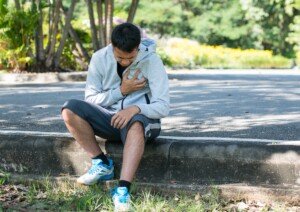You’re hiking along a scenic trail when suddenly you feel your heart flutter or thump: palpitations.
You’re far from your vehicle and nobody else is around. Should you worry?
That’s a pretty scary situation: suddenly feeling an irregular heartbeat, perhaps an extra one or a skipped one, while you’re breathing hard on a hike.
It makes you wonder if this is a sign that if you continue with the challenging hiking pace, you’ll have a heart attack.
This worry can be especially pronounced if the hiker has risk factors for a heart attack such as the following:
- Over 50 if male
- Over 45 if female
- Overweight
- Family history of coronary artery disease
- Too much sodium in the diet
- Too much processed food
- Loads of mental stress
- High blood pressure
- Diabetes
Heart Palpitations While Hiking
“Many people complain of feeling palpitations, both at rest and while exercising (e.g., going on a hike),” says Geoffrey Barnes, MD, cardiologist and vascular medicine specialist at the University of Michigan Health System.
“Most of the time the sensation of palpitations is not dangerous – in fact, it may not even come from your heart!
“Our brains have difficulty distinguishing if sensations are coming from the heart, lungs, esophagus or chest wall.
“If you are experiencing palpitations, it’s a good idea to discuss this with your doctor.
“Your doctor will likely have you wear a heart monitor for a few weeks.
“These monitors capture the electrical activity of the heart and can detect any arrhythmias (irregular or inappropriate heartbeats).
“The monitors also have features that allow people to ‘trigger’ them when they’re feeling palpitations, so that we can connect the symptoms with the heartbeats at the same time.”
Causes of Heart Palpitations
“There are many causes of palpitations,” begins Dr. Barnes.
“When they relate to the heart, two of the most common are premature ventricular contractions (PVCs) and atrial fibrillation (A-Fib).
“PVCs are an ‘extra heartbeat’ that are quite common – we all have them! They rarely cause problems unless they’re very common.”
The problem they cause when they’re common would be the discomfort with the frequent awareness of the palpitations. The patient can opt for treatment.
If lightheadedness, shortness of breath or chest pain accompany your palpitations, you need to see a cardiologist. The condition can be treated.
“A-Fib, on the other hand, can be dangerous,” says Dr. Barnes.
A-Fib can sometimes be felt; but there are times when it may not be perceived.
“A-Fib is an irregular heart rhythm that increases the risk of stroke,” continues Dr. Barnes.
“Most patients with A-Fib are recommended to take blood thinners (anticoagulant medications) to prevent stroke.
“We also have different treatments (both medications and procedures) that can help to reduce A-Fib and prevent the sensation of palpitations.
“Yes, if you feel palpitations while exercising, it’s a good idea to get checked out with your doctor.”
It doesn’t matter the type of exercise. There’s nothing inherent about hiking that would be more harmful to the heart than any other form of cardiorespiratory activity such as mountain biking, inline skating, jogging in a park, pedaling on an elliptical machine or taking a step aerobics class.
The heart does not know the difference between hiking, running, pedaling, jumping or swimming.
What’s more important is whether or not you over-exert yourself.
“If you’re feeling lightheaded, dizzy, short of breath or have chest pressure at the same time that you have a palpitation, you may need to go to a local emergency room for rapid evaluation.
“If you don’t have any of those other concerning symptoms, then a checkup with your primary care provider or cardiologist is a good idea.”
 Geoffrey Barnes, MD, is a cardiologist and vascular medicine specialist at the University of Michigan Health System and spokesperson for the World Thrombosis Day Campaign. Dr. Barnes’ clinical interests include treatment of vascular disorders, anticoagulation and general cardiac care.
Geoffrey Barnes, MD, is a cardiologist and vascular medicine specialist at the University of Michigan Health System and spokesperson for the World Thrombosis Day Campaign. Dr. Barnes’ clinical interests include treatment of vascular disorders, anticoagulation and general cardiac care.
 Lorra Garrick has been covering medical, fitness and cybersecurity topics for many years, having written thousands of articles for print magazines and websites, including as a ghostwriter. She’s also a former ACE-certified personal trainer.
Lorra Garrick has been covering medical, fitness and cybersecurity topics for many years, having written thousands of articles for print magazines and websites, including as a ghostwriter. She’s also a former ACE-certified personal trainer.
.










































